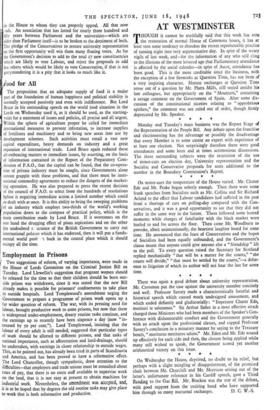AT WESTMINSTER
THOUGH it cannot be truthfully said that this week has seen the restoration of normal House of Commons hours, it has at least seen some tendency to abandon the recent reprehensible practice of turning night into very argumentative day. In spite of the weary vigils of last week, and—for the information of any who still cling to the illusions of the more leisured age that Parliamentary attendance is affected by the social calendar—in spite of Ascot, attendance has been good. This is the more creditable since the business, with the exception of a few fireworks at Question Time, has not been of a very inspiring character. Hottest exchanges at Question Time arose out of a question by Mr. Platts Mills, still seated amidst his late colleagues, but appropriately on the "Mountain," containing a savage comment on the Government of Spain. After some dis- cussion of the constitutional niceties relating to " opprobrious epithets," the comment was not ruled out of order, though firmly deprecated by Mr. Speaker.
Monday and Tuesday's main business was the Report Stage of the Representation of the People Bill. Any debate upon the franchise and electioneering has the advantage or possibly the disadvantage that every Member is to some extent an expert with experience of at least one election. Not surprisingly therefore there were good attendances and some keen and at times acrimonious discussions. The three outstanding subjects were the restriction of the use of motor-cars on election day, University representation and the Socialist and Conservative proposals for seats additional to the number in the Boundary Commission's Report. * * * * On motor-cars the temperature of the House varied. Mr. Chuter Ede and Mr. Peake began soberly enough. Then there were some frank speeches from Socialists such as Mr. Collins and Sir Richard Acland to the effect that Labour candidates had suffered in the past from a shortage of cars on polling-day compared with the Con- servatives, and it was a good opportunity to sec that they did not suffer in the same way in the future. There followed some heated moments while charges of familiarity with the black market were hurled to and fro across the floor. Then came Mr. Woodburn to provoke, albeit unintentionally, the heartiest laughter heard for some time. He announced that the fears of Conservatives and the hopes of Socialists had been equally unfounded, and the Government's clause meant that anyone could give anyone else a " friendship " lift to the poll. To every question raised the Secretary for Scotland replied mechanically " that will be a matter for the courts," " the courts will decide," " that must be settled by the courts,"—a defer- ence to litigation of which its author will not hear the last for some time. * * * * There was again a good debate about university representation. Mr. Crossman put the case against the university member concisely and well. Professor Savory made a characteristically forceful and historical speech which caused much undesigned amusement, and which ended defiantly and gladiatorially: " Imperator Chuter Ede, morituri to salutamus." Sir Arthur Salter in a most effective attack charged those Ministers who had been members of the Speaker's Con- ference with dishonourable conduct and the Government generally with an attack upon the professional classes, and capped Professor Savory's conclusion in a minatory manner by saying to the Treasury bench, " morituros morituros saluto." Mr. Eden and Mr. Ede wound up effectively for each side and then, the closure being applied while many still wished to speak, the Government scored yet another arithmetical victory on this issue.
On Wedneyay the House, deprived, no doubt to its relief, but perhaps with a slight mingling of disappointment, of the promised clash between Mr. Churchill and Mr. Morrison arising out of the latter's unfortunate reference in his Cardiff speech, gave a Third Reading to the Gas Bill. Mr. Bracken was the star of the debate, with good support from the untiring band who have supported him through so many nocturnal exchanges. D. C. W.-S.


































 Previous page
Previous page